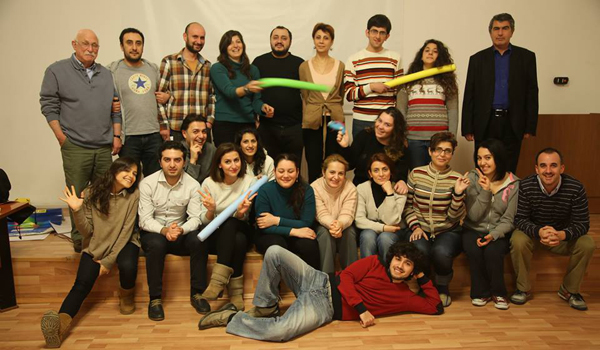Is it possible to imagine Armenians and Azerbaijanis to sit together for days to talk and discuss without insulting each other and raising voices? Some will say it is impossible, that sooner or later it will end up with a fight. Some will say that it is possible if the conversation and discussion is on neutral topics unrelated to our shared history and to current days. The get-together of Armenian and Azerbaijani journalists in Bakuriani, Georgia surprisingly demonstrated that even more than that is possible: journalists representing the two countries are able not only to discuss Hollywood movies and soccer, but also have a balanced discussion on what has had the biggest impact on our relations in the course of history, to understand the root causes of animosity and to look at possible ways for resolution of Karabakh conflict.
When your objective is to understand the viewpoint of your counterpart and present your own and you are governed by the notion that “to understand does not mean to agree” any discussion can take place and go on and on in a relaxed and respectful manner. In such a manner Azerbaijani historian-journalist heard for several times from the participant from Stepanakert that people of Karabakh could not imagine Azerbaijanis living again in Karabakh and made a final attempt and asked: “If Azerbaijan recognizes the independence of the Republic of Nagorno Karabakh, recognizes that Republic, will they allow back Azerbaijanis with Karabakh roots?”. Then he listened to the answer: “No, they do not want to listen about it because (a) the wounds of the war are still alive and that (b) people have concerns that it will cause serious demographic issue, i.e. Azerbaijanis will outnumber Armenians”, and said: “Well, I got your point, it is clear”.
The Imagine Center for Conflict Transformation implemented the Dialogue project for Armenian and Azerbaijani journalists in Bakuriani, resort city in Georgia from January 11to 17, 2014. Before that there were Dialogue projects for representatives of youth, historians and semi-official groups.
The Dialogue project for the journalists was fully consistent with its name. Every day we discussed our past and present for 8 to 10 hours under a tense schedule, but peacefully. When we were tasked to name the ten most important historic events that had an impact on relations between the two people, the answers of Armenian and Azerbaijani teams had certain similarities. Both sides remembered the events in the beginning of the 20th century, Sumgait massacres, Safarov’s heinous crime, Statement of the Supreme Council of the Autonomous Republic of Nagorno Karabakh to join Armenia.
Read also
Azerbaijani side recalled Azerbaijani non-commissioned officer Mubariz Ibrahimov who crossed the border on the eve of Clinton’s visit and killed 8 sleeping Armenian soldiers, they thought of it as a shameful and deplorable act. The “agreement of the century” for 1994 was named, which in the opinion of the Armenian side was the Bishkek ceasefire, but it turned out to be agreement on establishment of oil companies between the West and Baku. By the way, ceasefire was the precondition by the Western companies to sign the agreement. So, this is how the ceasefire was reached.
The discussion could not go without Khojaly. For Azerbaijani Khojaly events are unwavering and unquestionable as the Genocide is for Armenians, that’s what our counterparts told us. They had no doubt that what happened there were massacres of peaceful population and the Armenian viewpoint that Azerbaijanis had fabricated it, seemed nonsense to them. They said that Khojalu is the event, the episode that brings together the Azerbaijani in terms of ethnic identity.
For Azerbaijani journalists Safarov’s crime was grave and deplorable as it was for Armenians but at the same time they confessed that the campaign of authorities to glorify Safarov had had an impact on the society, especially on the youth. And I see why our Azerbaijani counterpart was upset when her Armenian counterparts jokingly asked her if “she has brought an axe with her”. For her Safarov is a deplorable criminal as for us and she said, “It’s not my fault that he is an Azerbaijani and I am an Azerbaijani…”
Speaking of the current situation both sides mentioned that the image of an enemy is enrooted in both of our societies and breaking that stereotype will take huge efforts, long time and great will.
Melania BARSEGYHAN
Bakuriani-Yerevan























































